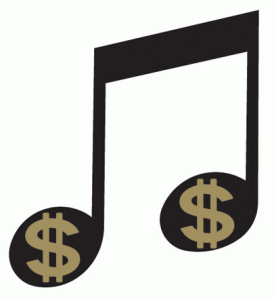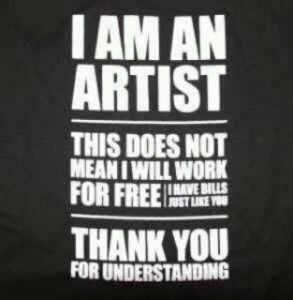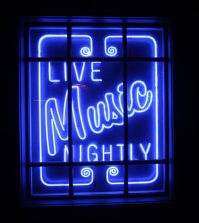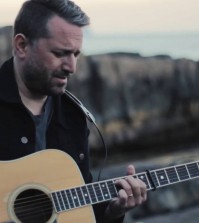- Jake Worthington at Faster Horses Festival: A Preview
- The Faster Horses Festival: A Preview of Michigan’s Premier Country Music Extravaganza
- Ryan Bingham at Extra Innings Festival
- Morgan Wade at Extra Innings Festival, 2024
- Sheryl Crow wows fans at Extra Innings
- Country Music Legend Toby Keith passes at age 62
Why Musicians Should Never Donate Their Talents
 Perhaps the biggest way society hoodwinks and exploits musicians is booking them for a fundraiser. If you’re a working musician, you’ve undoubtedly gotten this call: “Hi, it’s Jane from the _______Foundation. We were wondering if your band is able to play at our annual fundraiser next month at the _______ Lounge.” Often musicians, typically filled with self-doubt about their value anyway, will readily agree to play the event out of a sheer sense of feeling wanted. And they should feel wanted. It’s a valuable gift to have, and it has enriched their own lives in so many ways. They really should give back every now and then and contribute to worthwhile causes. Yes, all that gibberish has been beaten into musicians over the years by well-meaning non-musicians who haven’t a damn clue. And seeing that we’re a neurotic, insecure bunch anyway, we really believe this self-affirming baloney.
Perhaps the biggest way society hoodwinks and exploits musicians is booking them for a fundraiser. If you’re a working musician, you’ve undoubtedly gotten this call: “Hi, it’s Jane from the _______Foundation. We were wondering if your band is able to play at our annual fundraiser next month at the _______ Lounge.” Often musicians, typically filled with self-doubt about their value anyway, will readily agree to play the event out of a sheer sense of feeling wanted. And they should feel wanted. It’s a valuable gift to have, and it has enriched their own lives in so many ways. They really should give back every now and then and contribute to worthwhile causes. Yes, all that gibberish has been beaten into musicians over the years by well-meaning non-musicians who haven’t a damn clue. And seeing that we’re a neurotic, insecure bunch anyway, we really believe this self-affirming baloney.
The concept of the fundraiser is such an easy sell to us musicians on the surface, because the fact is that we love to play. And this where we get nailed. We love what we do, while a lot of people hate what they do. So non-musicians often see musicians as the perfect pawn in the fundraising game. Musicians like doing it, and they can attract a crowd. Convenient. And the more bands on the bill, the more people show up. Often a benefit runs for hours and hours, with 10-15 bands on the bill, all playing a half-hour set each. What a cash cow to have all those names on one poster! And it’s easy. Just call them up and they’ll say yes. Every time!
What, you ask, is the problem then? Musicians merely have to donate a half-hour of their time, contributing to a worthy cause that helps those in need…those worse off than us (as if there’s a poorer element of society besides musicians). After all, it’s not costing the musician anything…right? In my 20s I agreed to play every benefit. My thoughts were in line with the erroneous rationale above. I figured it was no sweat off my back to show up and strum a few tunes. “It’s only a half hour, and everyone else is doing it,” I’d say to myself.
As I grew into my 30s and got a bit more hip to the tricks of fundraisers, I began to change my tune when these charities would call. After listening to telephone spiel (outlined in the first paragraph), I would immediately say, “Sure! Our benefit fee is $____, which is lower than our regular fee of $____.” After an uncomfortable silence, the person on the other end would usually stammer out something like, “uh, well….we were hoping you could do it for free.” At this point, I have to admit I that would get filled with giddy delight at their uncomfortable and confused demeanour. My next reply would be: “Well, our band never plays for free. I know, I know….there are a load of bands out there that will give away their time. But you’re calling me because, unlike some of those other bands, mine has a following – which means you’ll actually raise some money. So let’s talk about how you can make a lot of money and we can get paid as well.” After a little bit of confusion on behalf of the caller, we would more often than not come to an agreement and settle upon a fee. I’d tell her not to bother booking a bunch of bands; just pay us and we’ll play the whole show. On one particular benefit show, for example, the venue held 300 people and the admission was $20. That’s a $6,000 door take. Not small change. Our band was able to fill the place on our own, as opposed to needing 10 bands to do so. So we charged $1,500 and they made $4,500 (and whatever else they were making on silent auctions, private donations, and all that).
Now think about it. Did that charity do ANYTHING to fill that place? Besides advertise our name on ads, no. The band attracted most of the people. And we still gave the charity 75% of the door revenue. Not a bad deal for them, if you ask me. Now if your band doesn’t have a draw, discard all of the above. You’re off the hook anyway because you can’t make any money for them. Just let them know that when they call, and you’ve dodged a bullet.
Now you might read what I just wrote and say to yourself, “What a greedy bastard, taking $1,500 away from heart and stroke victims.” When it comes to my musical abilities, I am greedy. You know why? Because everyone else in this world is greedy as well when it comes to the worth of his or her skills. How many plumbers and electricians do you think would do free installations in a new building being constructed by a charity foundation? How about the bricklayers? Carpenters? Please make those calls and let me know how it goes. This point, in fact, illuminates a sad irony: often the reason these foundations need money is so they can pay everyone else to do things like construct and furnish buildings. Once again, the musician works for free so others can get paid.
But getting back to the fundraiser event….who else might you think is making money in the above scenario? You guessed right: the establishment. Do you really think that all the bartenders, door people, servers, and sound techs are there because they feel so strongly about the plight of cancer patients? Nope. They’re there because they’re being paid to be there. Of course the bar owner must be discounting the booze or giving a dollar or two from each drink to the charity. Or maybe the staff are donating tips? Think again. Not happening. This would go against every rule of a profit-driven business, and bars are about as profit-driven as they come. Why do you think the price of a drink has doubled in ten years while the pay for bar musicians has stayed the same? Bar owners are geniuses, really. They’ve found a goldmine with musicians….just like the fundraisers have. Our labour is either cheap or free. How the hell can you blame them for taking advantage? We haven’t demanded any different.
I do realize that there are volunteers who give freely of their time. For certain. And I’m not taking that away from them. Some have sick relatives, and some are just lonely and want to feel connected to community or whatever. But do you think these non-profit fundraising organizations are run solely by volunteers? No. People are paid salaries to run these foundations, and rightly so. They’re doing a job – just like the musician.
Ultimately, It takes most musicians at least ten years’ experience to snap out of the “playing for glory” mode and wake up to the fact that society likes to exploit musicians all time, in many ways. Even friends and family do it to you: “Come to my party…..bring your guitar,” or “can your band play my wedding reception? It’s only for a few hours.” Of course I could go on and on about how musicians are too fickle and unorganized to adhere to any union of sorts; this would mean that Joe Picker wouldn’t be able to take off early from his day job on Friday and satisfy his rock star fanstasy playing bad versions of “Wagon Wheel” and “Brown-Eyed Girl” at the Corner Lounge for $40 and all the cougar attention he can handle.
So if you’re a musician who feels obliged to play every fundraiser event happening in your town (some even TRY to get on these events for exposure, which is another gripe of mine altogether), think for a minute about the hard reality that everyone else involved is getting paid at your expense. Just think: if you stay home and don’t play a benefit, you won’t have to pay for gas, parking, new strings, the few beers you drink (there are never drink tickets), a cab home, or other probable incidentals. You won’t have to use someone else’s stinky microphone or broken down, borrowed gear. You won’t have to participate in hokey door prize announcements (oh, they will recruit you as M.C. as well if you’re not careful).
Here’s how you handle it: suggest that your band has such a good draw that they can afford to pay you and STILL make a lot of money. And as I said…if your band doesn’t have a draw, all the better. Tell them that they’re dumb for wanting you, because no one ever comes to see your band anyway. But whatever you do, just stop playing for free – especially at benefits – unless you’re sure that everyone else is working for free as well. Now if you’re a big star and don’t need the money, go for it. Big stars attach themselves to charities all the time. It’s good for the public persona, and somewhere along the line a tax rebate is usually cut for your time and talents. All good. But if you’re a working musician on a local level who respects him/herself and other musicians, refrain from the freebies and stop making money for everyone else but yourself.


















Pingback: Work For Free Musicians - Mark Weber Music Blog
Pingback: ‘Come Play for Free, it will be Good Exposure’: Musicians, Performance, and Exposure as Currency | Something About Funk
Pingback: Weekend Picks